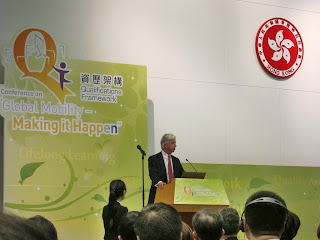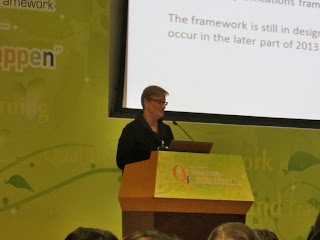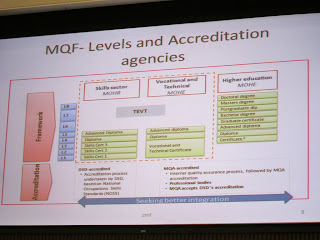The QF Conference on "Global Mobility - Making it Happen" was co-organized by Education Bureau (EDB) of the Government of the HKSAR and Qualifications Framework Secretariat (QFS) of Hong Kong, and Scottish Credit and Qualifications Framework Partnership (SCQFP) of Scotland from 18 to 19 March 2013. Hong Kong Council for Accreditation of Academic and Vocational Qualifications (HKCAAVQ) was a partner organization. The conference aims to share best practices in the development and implementation of QFs globally; to explore the merits and feasibility of referencing or alignment of QFs with the aim of facilitating learner mobility and articulation; and to examine the role of quality assurance in promoting mutual trust and recognition.
The conference separated into two days. Day 1 was the keynotes and panel discussion; and Day 2 was the concurrent workshops.
Dr. Yeung (Co-op member, HKSQ) and I (Former Chairman, HKSQ) were invited to attend the conference.
In the beginning, Mr. Eddie NG, SBS, JP (Secretary for Education, HKSAR Government) gave a welcoming address.
Then Sir Andrew CUBIE, CBE, FRSE (Chairman, SCQFP, Scotland) gave a keynote speech.
Group photo
Mrs. Tse briefed the background of globalization, knowledge-based society and talent grooming needs. Therefore, Qualifications Framework had established since May 2008. There was a seven-level hierarchy with robust quality assurance mechanism. Until now, there were about 210 education and training providers registered. Industries join the QF by setting up Industry Training Advisory Committees (ITACs) to draw up Specification of Competency Standards (SCS).
The second speakers were Dr. Mike COLES (International Consultant (Qualification Systems) and UK Representative, European QF) and Ms. Andrea BATEMAN (International Consultant (Qualification Systems), Australia) and their presentation was "International Referencing of QFs: Sharing Experiences in the European and Asian Contexts".
Dr. Coles briefed the European Qualifications Framework (EQF) which was collaborated with 32 countries of the European Union and Economic Area. The EQF was not regulatory but voluntary. Then the Association of South East Asian Nations (ASEAN) Qualifications Reference Framework (AQRF) were introduced. The ASEAN members included Brunei Darussalam, Cambodia, Indonesia, Lao PDR, Malaysia, Myanmar, Philippines, Singapore, Thailand and Vietnam. Both EQF and AQRF had regional quality assurance frameworks. Components of this regional frameworks included "Voluntary code of practice", "Agreed levels and descriptors", "Agreed range of functions", "Quality assurance arrangement", "Referencing process", "Collaborative management" and "Monitoring arrangements".
The EQF has 8 levels which defined through learning outcomes included knowledge, skills and competence. The EQF portal and comparison with other QF were mentioned ( http://ec.europa.eu/eqf/compare_en.htm ).
Then Ms. BATEMAN described ASEAN Qualification Reference Framework (AQRF) that it would function as a translation device to enable comparisons of qualifications across member countries and address all education sectors. She also briefed the 5 key principles which were Transparency, Accountability, Continuous Improvement Approach, Flexibility and Responsiveness, as well as, Comparability.
After tea break, Plenary Session was performed and its topic entitled "Quality Assurance: The Cornerstone to Transnational Alignment of QFs".
Mr. Robert FEARNSIDE (Deputy Executive Director, HKCAAVQ, HKSAR) was the session facilitator.
Dr. Janet BROWN (Chief Executive, Scottish Qualifications Authority (SQA), Scotland) was the first panelist and presented her topic "Why Quality Assurance Matters". Dr. Brown stated key messages on the importance of QA in QFs and framework alignment. For quality assurance, it needed Standards, Trusted by ALL and Benefits through Recognition, Comparability, Benchmarking and Portabilty. Then the Scottish Credit and Qualitfications Framework was explained more details.
The second panelist was Prof. Mala SINGH (Independent Consultant, South Africa, and Council Member, HKCAAVQ) and her presentation named "The Qualifications Framework and Quality Assurance in South Africa". The 1st generation SA QFs legislated in 1995 and revised QF in 2008. There was 10 levels with descriptors.
The third panelist was Prof. Zita Mohd FAHMI (Deputy Chief Executive Officer (Quality Assurance), Malaysian Qualifications Agency (MQA), Malaysia) and her topic entitled "The Cornerstone to Transnational Alignment of Qualifications Framework - The Malaysian Experience - SOC".
Prof. Fahmi briefed the Malaysia QF which applied to all higher education programmes.
Ms. Ann DOOLETTE (Executive Director, Australian Qualifications Framework Council (AQFC), Australia, and Council Member, HKCAAVQ) was the last panelist and her presentation named "The Cornerstone to Transnational Alignment of Qualifications Framework - The Australia Experience"
Ms. Doolette mentioned the global mobility phenomenon such as Australian travelled overseas for work and large consumer of skilled migrants whose qualifications needed to be recognized in Australia. The Australia's Comprehensive National Qualifications Framework (AQF) were introduced.
Day 2 (19 Mar 2013)
There were three concurrent Workshops. Workshop A entitled "Building Articulation Pathways Across Sectors". Workshop B named "Linking Education and Training with Industry" and Workshop C was "QF: A Platform for Lifelong Learning". I attended the Workshop B and summarized as follows.
Dr. Janet BROWN (Chief Executive, Scottish Qualifications Authority (SQA), Scotland) was the first panelist and presented her topic "Why Quality Assurance Matters". Dr. Brown stated key messages on the importance of QA in QFs and framework alignment. For quality assurance, it needed Standards, Trusted by ALL and Benefits through Recognition, Comparability, Benchmarking and Portabilty. Then the Scottish Credit and Qualitfications Framework was explained more details.
The second panelist was Prof. Mala SINGH (Independent Consultant, South Africa, and Council Member, HKCAAVQ) and her presentation named "The Qualifications Framework and Quality Assurance in South Africa". The 1st generation SA QFs legislated in 1995 and revised QF in 2008. There was 10 levels with descriptors.
The third panelist was Prof. Zita Mohd FAHMI (Deputy Chief Executive Officer (Quality Assurance), Malaysian Qualifications Agency (MQA), Malaysia) and her topic entitled "The Cornerstone to Transnational Alignment of Qualifications Framework - The Malaysian Experience - SOC".
Prof. Fahmi briefed the Malaysia QF which applied to all higher education programmes.
Ms. Doolette mentioned the global mobility phenomenon such as Australian travelled overseas for work and large consumer of skilled migrants whose qualifications needed to be recognized in Australia. The Australia's Comprehensive National Qualifications Framework (AQF) were introduced.
Day 2 (19 Mar 2013)
There were three concurrent Workshops. Workshop A entitled "Building Articulation Pathways Across Sectors". Workshop B named "Linking Education and Training with Industry" and Workshop C was "QF: A Platform for Lifelong Learning". I attended the Workshop B and summarized as follows.
In Workshop B, the facilitator was Ms. Andrea HOPE (Associate Academic Vice-President, Hong Kong Shue Yan University, HKSAR).
The first speaker was Ms. Jeanette ALLEN (CEO, Service Skills Australia, Australia) and her topic named "Discuss, Display, Do: a model for recognising skills". She discussed what did industry want such as job-ready graduates, multi-skilled workers and education and training system that met industry needs.
Then the Discuss, Display, Do Skills Assessment model was mentioned.
The second speaker was Prof. Zita Mohd FAHMI (Deputy CEO (Quality Assurance), MQA, Malaysia) and her topic was "Improvement of Higher Education Quality-Linking Education and Training with industry".
Prof. Fahmi mentioned the challenges such as up-grading and up skilling of workforce to support economic growth that needed to improve the linkage between higher education and industry. There were 29 sectors with 1690 National Occupational Skill Standards (NOSS) in Malaysia. Then MQF model was showed and discussed.
Ir. Alkin KWONG, JP (President, Hong Kong Association of Property Management Companies, HKSAR) was the third speaker and his presentation entitled "Linking Education and Training with Industry".
Mr. Kwong introduced how QF help to link education & training with the Property Management Industry (PMI). The solution was to set up clear competency standards for recruitment and promotion and assisted practitioners in attaining various QF levels by recognizing their past experience, knowledge and skills. The SCS of Property Management Industry was discussed. Finally, Mr. Kwong concluded "Overall, QF has helped a lot in meeting the education and training requirements of the PMI and has laid a solid foundation and provide a suitable framework for the continuous professional development of the practitioners to meet future manpower needs in the industry.
Then Ms. Suzi Tang (Senior Customer Services Executive, Chow Sang Sang) shared her experience from an employee embarking on SCS-based courses in jewellery retailing industry.
Ms. Suzi introduced the certificate in Jewellery Retailing which was 2-year course with QF level 2. She said it was a 360-degree learning style included classroom lecture, self-assignments and shop attachment.
After tea break, Plenary Session was performed and its topic entitled "Use of Credit and Credit Accumulation and Transfer (CAT): Experience Sharing form SCQF and HKQF".
Mr. Anthony CHAN (Project Coordinator (Further Education), Education Bureau, HKSAR Government) was facilitator in this session. (Left 1)
Ms Aileen PONTON (Executive Director, Australian Qualifications Framework Council (AQFC), Australia, and Council Member, HKCAAVQ) was the first panelist to present the topic named "Global Mobility - Making it Happen Use of Credit and CAT".
SCQF aimed to assist people of all ages and circumstances to access appropriate education and training over their lifetime to fulfil their personal, social and economic potential. All mainstream qualification in the Framework and SCQF level descriptors firmly embedded within institutional curriculum planning. It was successful to increase articulation in student numbers and a range of formal agreements between institutions.
Prof. Reggie KWAN (Convenor, Working Group of Pilot Exercise on Use of Credit, HKSAR) was the second panelist and his presentation entitled "Qualifications Framework: Use of Credit - Form pilot exercise to implementation".
Prof. Kwan briefed QF level and award title scheme (ATS), as well as pilot exercise on the use of credit (e.g. 10 providers with 15 programmes at levels 2 to 4 of the QF). The Key concept demonstrated in the following picture.
The estimation of notional learning hours were depended on seven elements such as Lectures, Tutorials, Labs, Assessment, Seminar, Internship and Online. The following table showed the ratio of contact hours to self-study hours. Moreover, there were five higher education institutes signed collaboration agreement for Credit Transfer and Student Exchange. They were The Open University of Hong Kong, Caritas Institute of Higher Education, Tung Wah College, Hang Seng Management College and Chu Hai College of Higher Education.
The last panelist was Dr. Richard ARMOUR (Secretary-General, University Grants Committee, HKSAR Government) and his topic named "Credit Accumulation and Transfer System (CATS) in Hong Kong - A Suggested Implementation Framework".
Dr. Armour briefed the HER Report (Aspirations for the Higher Education System in Hong Kong) which published in December 2010. The UGC proposed to develop vertical CATS to facilitate articulation from sub-degree programmes to senior year of undergraduate studies. CATS would bring the benefits included "Lifelong learning", "Widening participation", "Flexibility", "Efficiency" and "Transparency".
Panel facilitators of different workshops gave a summary report.
Sir Andrew CUBIE, CBE, FRSE (Chairman, SCQFP, Scotland) gave concluding remarks.
Finally, Ms. Michelle LI, JP (Deputy Secretary for Education, HKSAR Government) concluded the gain from this conference.
Reference:
Hong Kong Qualifications Framework (HKQF) - http://www.hkqf.gov.hk/guie/home.asp
Scottish Credit and Qualifications Framework (SCQF) - http://www.scqf.co.uk/
Information of the QF Conference - http://www.hkqf.gov.hk/guie/RC_evt_20130318.asp
Dr. Armour briefed the HER Report (Aspirations for the Higher Education System in Hong Kong) which published in December 2010. The UGC proposed to develop vertical CATS to facilitate articulation from sub-degree programmes to senior year of undergraduate studies. CATS would bring the benefits included "Lifelong learning", "Widening participation", "Flexibility", "Efficiency" and "Transparency".
Panel facilitators of different workshops gave a summary report.
Reference:
Hong Kong Qualifications Framework (HKQF) - http://www.hkqf.gov.hk/guie/home.asp
Scottish Credit and Qualifications Framework (SCQF) - http://www.scqf.co.uk/
Information of the QF Conference - http://www.hkqf.gov.hk/guie/RC_evt_20130318.asp



































沒有留言:
發佈留言